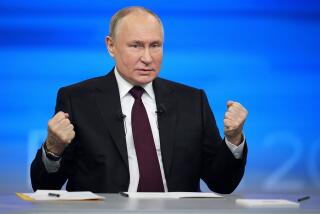New Premier Appeals for Russian Unity
MOSCOW — Russia is in danger of breaking apart under the strain of its economic troubles, the country’s new prime minister acknowledged Tuesday, and he pleaded with regional governors to preserve the union rather than build fiefdoms.
“We must put an end to feudal attitudes,” Yevgeny M. Primakov told the governors, “or we shall lose Russia as a single state.”
Primakov, confirmed as prime minister less than three weeks ago, has made practically no progress toward solving Russia’s economic crisis. Many of the country’s powerful governors--virtual autocrats in their 89 republics and territories--have stepped in instead, threatening to hoard taxes, seize industries and even print their own currencies while the Kremlin wavers.
With the economy in ruins and the federal government in disarray, some analysts have suggested that Moscow may have to ease its hold over the rest of the country and let governors pick up the slack.
But Primakov gave no indication that he is prepared to consider such an option. Instead, he called the governors to Moscow and made an impassioned appeal for unity in the time-honored manner--with “a whip and sweet cakes,” the Russian version of the carrot and stick.
On the one hand, he offered the governors an equal share of new tax revenue from alcohol. On the other, he threatened new laws to impeach governors who resist federal directives.
Local governments have the right to raise their own revenue, he said, “but that should not nourish separatism.”
Primakov’s appeal came as Russia enters what promises to be a season of protests, starting with Communist-sponsored demonstrations by scientists and students in and around Moscow today. These are to culminate in a nationwide day of protest next week that could either moderate or escalate the country’s deep anger over the economy.
“People will take to the streets because they are tired of this grim life,” said Alexander I. Lebed, the former general and presidential candidate who is now governor of Siberia’s massive Krasnoyarsk region.
But even Lebed, considered a leader of the “separatist” forces when he threatened this month to start printing his own currency, sounded a more measured note during a news conference Tuesday.
For centuries, he said, Russia has suffered from a “dinosaur syndrome”--”The body is huge, and the head is small and sometimes stupid. The signals take a long time to reach the tail.”
But Lebed said he is not in favor of weakening the Russian Federation--in fact, he suggested that strengthening the periphery could also strengthen the center.
“Reality suggests we must redistribute property, power and taxes in favor of the regions,” he said. “And then strong regions will combine into a strong state, and any tendency toward separatism will disappear.”
Meanwhile, Primakov’s half-formed government pushed to develop an economic recovery plan. Government spokesman Andrei Korotkov announced that preliminary work had been completed, but he provided no details.
Similarly, Finance Minister Mikhail M. Zadornov met with government creditors to discuss a plan to pay off defaulted government bonds. He said the bondholders, both Russian and Western, have agreed to the terms, which he didn’t reveal.
The government also announced the appointment of a new tax chief, centrist lawmaker Georgy Boos. He replaces Boris Fedorov, whose get-tough policies won praise from international lenders but ensured that he was too unpopular to be invited into the new government.
More to Read
Sign up for Essential California
The most important California stories and recommendations in your inbox every morning.
You may occasionally receive promotional content from the Los Angeles Times.










